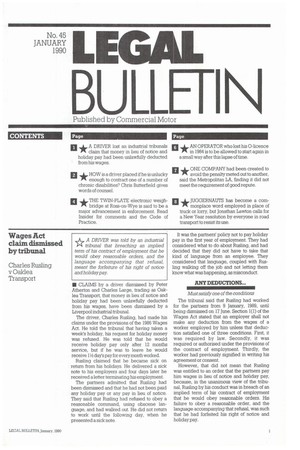Wages Act claim dismissed by tribunal
Page 3

If you've noticed an error in this article please click here to report it so we can fix it.
A DRIVER was told by an industrial A.-3. tribunal that breaching an implied term of his contract of employment that he would obey reasonable orders, and the language accompanying that refusal, meant the forfeiture of his right of notice and holiday pay.
• CLAIMS by a driver dismissed by Peter Atherton and Charles Large, trading as Oaklea Transport, that money in lieu of notice arid holiday pay had been unlawfully deducted from his wages, have been dismissed by a Liverpool industrial tribunal.
The driver, Charles Rusting, had made his claims under the provisions of the 1986 Wages Act. He told the tribunal that having taken a week's holiday, his request for holiday money was refused. He was told that he would receive holiday pay only after 12 months service, but if he was to leave he would receive 11/2 day's pay for every month worked.
Rusting claimed that he became sick on return from his holidays. He delivered a sick note to his employers and four days later he received a letter terminating his employment.
The partners admitted that Rusting had been dismissed and that he had not been paid any holiday pay or any pay in lieu of notice. They said that Rusting had refused to obey a reasonable command, using obscene language, and had walked out. He did not return to work until the following day, when he presented a sick note. It was the partners' policy not to pay holiday pay in the first year of employment. They had considered what to do about Rusting, and had decided that they did not have to take that kind of language from an employee. They considered that language, coupled with Rusting walking off the job and not letting them know what was happening, as misconduct.
ANY DEDUCTIONS... Must satisfy one of the conditions The tribunal said that Rusling had worked for the partners from 9 January, 1989, until being dismissed on 17 June. Section 1(1) of the Wages Act stated that an employer shall not make any deduction from the wages of a worker employed by him unless that deduction satisfied one of three conditions. First, it was required by law. Secondly, it was required or authorised under the provisions of the contract of employment, Thirdly, the worker had previously signified in writing his agreement or consent.
However, that did not mean that Rusting was entitled to an order that the partners pay him wages in lieu of notice and holiday pay, because, in the unanimous view of the tribunal, Rusling by his conduct was in breach of an implied term of his contract of employment that he would obey reasonable orders. His failure to obey a reasonable order, and the language accompanying that refusal, was such that he had forfeited his right of notice and holiday pay.
















































































































